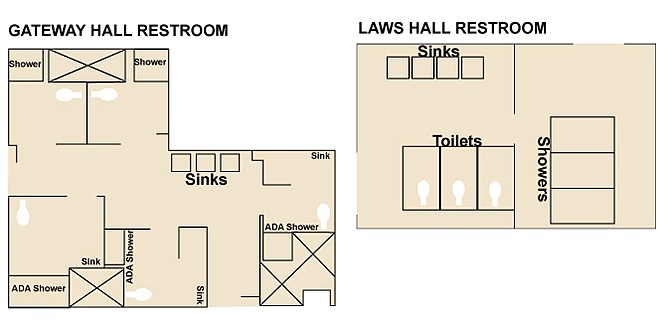Since their introduction on March 12, two bills that would restrict the creation of gender-neutral spaces in Missouri have triggered a flurry of news coverage and conversation.
But it's unclear what impact the bills, sponsored by Rep. Jeff Pogue, R-Salem, would have.
That might be OK with Pogue. When asked about potential implications of the proposed measures, House Bills 1338 and 1339, Pogue said he designed them "to shed light on this entire subject" of gender-neutral environments.
Pogue's bills don't define the term, but generally, gender-neutral environments are spaces that any gender can use, or that are not gender-segregated.
"This is an important enough issue that it needs to be handled correctly, and the best way to handle it is to talk about it in these chambers, the House and the Senate. It's tailored right now to make people talk about what policy should be and what policies cannot be allowed," Pogue said.
Part of the conversation surrounding the bills has been whether their passage would curtail the University of Missouri's plans to offer gender-neutral housing in the fall. At that time, the university will also open a new residence hall, Gateway, which will have unisex bathrooms.
No gender-neutral spaces
House bill 1339 would prohibit appropriation or spending of state funds for entities that have programs, projects or policies that create gender-neutral environments. Spaces mandated by federal or state court to be gender neutral would be exempted from the ban.
"The best way to influence policy and change is through appropriation of the budget," Pogue said.
The bill doesn't specify to what "entities" it would apply, or what it implies by "gender-neutral environment."
Such broad definitions make gauging the potential impact of the bill difficult, said Kyle Piccola, a lobbyist with PROMO.
Pogue introduced his bills roughly a month after MU announced its gender-neutral housing project. In the 16-bed space on the first floor of College Avenue Hall, students of any gender will be able live together in the same room or suite.
MU's initial motivation for implementing gender-neutral housing was to create an inclusive environment for students who identify as transgender or gender nonconforming, Director of MU Residential Life Frankie Minor said.
But the project will also allow relatives, such as twins of different genders, to room together. In the past, the department has received such requests but it hasn't been able to accommodate them because all rooms are designated male or female, Minor said.
If Pogue's bills passed and MU's project went on as planned, the Department of Residential Life might have little to lose- it doesn't get money from the state.
About 92 percent of the department's funding comes from housing fees, Minor said. Other sources of revenue for residential life include the vending machines in residence halls and summer camps that use the department's residential buildings.
In addition, Pogue's bills might not hurt future construction or renovation of residence halls. Money for those projects comes from revenue bond issues, not the state.
The picture looks similar at Northwest Missouri State University, which has had gender-neutral housing for about four years.
There, Residential Life is also funded with student housing fees, and construction and renovation projects don't receive state dollars, said Scott Shields, coordinator of Residential Life Operations.
"If they're saying we're not going to give money to your school if you have gender neutral housing, it would potentially hurt us on the academic side of the house, but not the housing side," Shields said.
About 750 of Northwest Missouri State's 2,500 beds are part of the gender-neutral housing option, Shields said. Several room configurations are available, most of them featuring a single-occupancy private bathroom inside the living unit.
Limitations on public gender-neutral bathrooms
Pogue's other bill, House bill 1338, would require all public restrooms to be gender-divided unless they are single occupancy.
The legislation would also prohibit state subdivisions, businesses, buildings or facilities with public restrooms from having policies against the bill's provisions.
Gateway, a new residence hall at MU, is set to open in the fall. The bathrooms there will unisex, and they will have common sink areas and private toilet and shower rooms with full-height walls and full-height lockable doors, according to the Department of Residential Life website.
"Amnesty International includes gender-segregated toilet facilities among its list of recommendations to protect the safety of girls in school," according to the press release. "This thought can be easily be expanded to restroom facilities outside of the school.
"I believe that if the state of Missouri were to change a social norm of this magnitude, it should be held consistent across the state, and the General Assembly should be the only and sole part of government to make this call."
Even if House bill 1338 passes, the opening of Gateway might not suffer. In residence halls, only restrooms in the lobby are considered "public," Minor said. The bathrooms on the main floors are reserved for residents or their guests, who have to be escorted at all times, according to Residential Life policies.
Any wings?
PROMO's Piccola called the bills an "attack" on transgender people.
"They want a space where people feel they can be themselves, that they're welcome, and if this bill is aimed at stopping that, then that's definitely disheartening to see," Piccola said.
Although PROMO considers Pogue's bills harmful to the transgender community and the public in general, the organization hasn't taken any action yet.
Neither of Pogue's bills has been assigned to committee. Legislation filed this late into the session usually doesn't get much traction, Piccola said.
"We're just waiting to see if the bill even has any wings and hear the conversations and hear the reason as to why the bill sponsor decided to present the bill," Piccola said.

